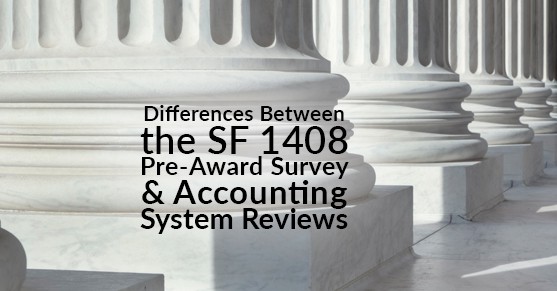In a previous blog, we gave an overview of the SF 1408 Pre-Award Survey and offered our opinions on best practices, as well as essential criteria when approaching this survey. One thing we noted was that SF 1408 is not an audit, nor is it an Accounting System Review (ASR); however, we didn’t offer a full explanation of the difference between them. In this blog, we’d like to flush out some of the significant differences between the two.
First of all, it’s essential to understand that although they serve different purposes, pre-award surveys and ASRs are used to make sure that government contractors are operating their accounting and financial systems appropriately. When a government agency opts to review your accounting systems, they aren’t doing it to give you a hard time. The purpose is to make sure government funds are being used correctly and that companies are conducting themselves accordingly.
Ultimately, the purpose of both is to confirm that a business has an approved accounting system. With an approved accounting system, government contractors gain the advantage over competitors bidding on RFPs that have the requirements included in either SF 1408 or an ASR.
The Difference Between SF 1408 and an ASR
More often than not, companies handling an SF 1408 pre-award survey are either new to government contracting or beginning to deal with cost-reimbursement contracts when they previously hadn’t. Although the DCAA evaluates the general design of a company’s accounting system during this survey, they don’t test complete functionality (i.e., running test transactions). If your business has a reliable accounting system design, then they’ll give you the go-ahead to use it. If the design appears to be faulty, the DCAA will offer recommendations on how to improve it and get it up to standards.
On the other hand, ASRs include thorough testing of accounting systems to ensure that the accounting system is fully functional and able to handle various types of transactions. All standards follow criteria mapped out in DFARS clause 252.242-7006. The extensiveness of an ASR is another significant difference; in essence, most of these reviews require a considerable amount of time and attention, often lasting one to two months. Typically, the administrative contracting officer (ACO) takes the reins on deciding whether the system is sufficient; so long as the organization doesn’t make significant changes to the system, the ACO’s determination will hold for up to three years.
Best Practices for SF 1408 and ASRs
Our blog on SF 1408 lays out a few best practices for government contractors to follow, and we think a few of them apply to ASRs as well. For instance, keeping accurate documentation of your system no matter what survey, review, or audit is making its way toward your business is essential. And, in the case that it does, always stay in close contact with your ACO and other contracting officers. It never hurts to ask them questions or request some guidance.
Finally, no matter what type of contract is looming in the future, stay on top of requirements, whether those requirements are outlined in an RFP, or the DCAA enforces them. Things change rapidly in government contracting, so understanding essential details and conditions will always give your business the upper-hand.
Hopefully, this blog has cleared some of the fog around the differences between the SF 1408 pre-award survey and ASRs. Government contracting is inundated with audits, reviews, surveys, and other accounting system inspections, which is why so many new government contracting businesses find it difficult to prepare all the necessary documents and processes. If you’re a new government contractor and need help preparing your organization for an SF 1408 pre-award survey, an ASR, or any other DCAA/DCMA review, feel free to reach out to GovCon365! Each member of our team is an expert on government contracting regulations, and our Microsoft Dynamics 365 for Government Contractors solution is designed to support your business in any review, survey, or audit scenario.

